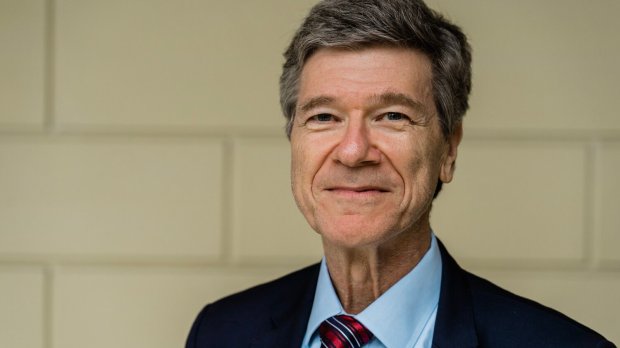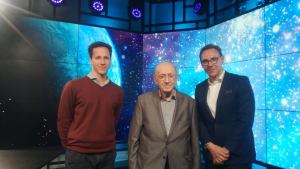The Columbia University-based economist Jeffrey Sachs has been appointed to the Pontifical Academy of Social Sciences, drawing criticism from some.
Pope Francis appointed Sachs an ordinary member of the academy, the Holy See Press Office said on Monday.
Pope John Paul II created the social sciences academy in 1994 with the aim of promoting the study and progress of the social sciences and of offering the Church elements for the development of her social doctrine.
John Paul said the intention of the Pontifical Academy is to “gather all the grains of truth present in the various intellectual and empirical approaches, in the image of St. Thomas Aquinas who remains an example for philosophical and theological reflection.”
Other members have included former US Ambassador to the Holy See Mary Ann Glendon; scholars such as Paolo Carozza, F. Russell Hittinger, and Michel Schooyans; European politicians Mario Draghi, Rocco Buttiglione, and Janne Haaland Matlary. Members come from a variety of political and ideological viewpoints.
Born November 5, 1954, in Detroit, Sachs is the director of the Center for Sustainable Development at Columbia University in New York. An economist specializing in anti-poverty issues, he taught at Harvard University and was director of the Earth Institute at Columbia University. He is currently President of the United Nations Sustainable Development Solutions Network.
The Economist magazine ranked him among the top three most influential living economists. He has authored and edited numerous books, including three New York Times bestsellers: The End of Poverty (2005), Common Wealth: Economics for a Crowded Planet (2008), and The Price of Civilization (2011). Other books include Building the New American Economy: Smart, Fair & Sustainable (2017), A New Foreign Policy: Beyond American Exceptionalism (2018), and most recently, The Ages of Globalization: Geography, Technology, and Institutions (2020).
Supported distributing contraceptives
Over the course of his very public career, Sachs has advocated for the reduction of fertility rates in developing countries through the dissemination of contraceptives, a position at odds with Catholic moral teaching. In 2011, Sachs commented to CNN, “Success at reducing high fertility rates depends on keeping girls in school, ensuring that children survive, and providing access to modern family planning and contraceptives.”
When Catholic News Agency, early in 2020, asked Bishop Marcelo Sánchez Sorondo, chancellor of the Pontifical Academy of Social Sciences, about that statement, Bishop Sánchez Sorondo responded that Sachs “has changed.” The economist “integrates the magisterium of the Church and of Pope Francis into economics by putting the human person and the common good at the center,” Sánchez Sorondo said.
No stranger at the Vatican
Indeed, Sachs has been no stranger to the Vatican, even before his alleged “change.” In 1991, according to his CV, he was an advisor to the Pontifical Council on Justice and Peace to Pope John Paul II on the encyclical Centesimus Annus. At the end of that decade, when he was an advisor to the Jubilee Campaign on developing country debt cancellation, he had an audience with Pope John Paul.
Since November 2019, he has co-chaired the Science and Ethics for Happiness (SEH) Project, an initiative hosted and managed by Bishop Sánchez Sorondo, in partnership with the UN Sustainable Development Solutions Network (SDSN), Columbia University’s Center for Sustainable Development, the Blue Chip Foundation, the Ernesto Illy Foundation, Davines Group, and Chiesi Foundation. According to Sachs’ CV:
The SEH Project convenes academics and experts from the fields of psychology, neuroscience, philosophy, theology, and other disciplines to explore happiness and well-being from an interdisciplinary perspective. The objective is an actionable synthesis based on recent scientific findings, philosophical wisdom, and the Church’s teachings. Sessions will cover topics such as the philosophical and theological understandings and underpinnings of happiness, the cardinal virtues and happiness, the natural science of happiness, the sociology of happiness, the politics of well-being, the causes and cures of modern addictions, the global epidemiology of mood and anxiety disorders, the emerging neuroscience of happiness, well- being education and the happiness of the young, digital technologies and well-being, and global economics, sustainable development, and happiness.
From 2016-2019, he was co-convener of Ethics in Action, which “seeks to advance the moral efforts essential to grappling with the challenges to sustainable and integral development,” the CV says.
The moral dimension focuses on the human capacity to achieve sustainable and integral development and the corresponding moral obligations to actuate that capacity. Pope Francis’ encyclical, Laudato Si’, offers the foundational text for this effort. The encyclical, as Pope Francis wrote, addresses “every person living on this planet … In this Encyclical, I would like to enter into dialogue with all people about our common home.” Ethics in Action is also guided in a significant fashion by the Sustainable Development Goals, which offer a compelling global framework for action and cooperation on behalf of our common home and its people.
Accordingly, Ethics in Action brings together a select group of religious leaders, theologians, academics, business and labor leaders, development practitioners, and activists to identify the values and ethics needed to advance concrete actions in response to these challenges. It does not aim for technical or policy solutions, but instead seeks to draw out the underlying ethical values and principles needed to inform a shared moral vision of human flourishing—including the development of a multi-religious moral consensus that can be communicated widely across diverse religious communities and other stakeholders to equip them with the moral agency essential to overcoming these challenges.
In February 2020, Sachs was invited to participate in a congress on the theme “New forms of solidarity.”
In 2017, during a working session of the Pontifical Academy of Social Sciences, he considered that the Social Doctrine of the Church was an alternative to the “unlimited greed” of certain expressions of capitalism.
Most recently, he spoke with other economists at the Vatican event The Economy of Francesco, organized online in November 2020.
Criticism from pro-life advocates
Stefano Gennarini, Vice President for Legal Studies at the Center for Family and Human Rights (C-Fam), which lobbies at the United Nations, wrote in 2014 that Sachs “made a plea for legalizing abortion as a cost-effective way to eliminate ‘unwanted children’ when contraception fails in his 2008 book Common Wealth: Economics for a Crowded Planet.”
“He describes abortion as a ‘lower-risk and lower-cost option’ than bringing a new human life to the world,” Gennarini wrote. “He also glowingly writes that the ‘legalization of abortion reduces a country’s total fertility rate significantly, by as much as half a child on average,’ and criticizes Ronald Reagan and George H.W. Bush for denying groups that provide and promote abortion any U.S. funding through the Mexico City Policy.”
Also problematic for Gennarini is the possibility that the Vatican seems to be passively approving of Sachs’s views. The economist is listed as an author of the background note to a declaration adopted by scientists and religious leaders at a Vatican conference, “which validated the theory that human activity is changing the Earth’s climate,” Gennarini said. “Unlike the declaration, the background note with a Vatican emblem at the head speaks of the world’s population as a problem.”
This week, Sachs said he is “profoundly honored to become an academician of the Pontifical Academy of Social Sciences.”
“I believe that the Church’s social teachings, and Pope Francis’s great encyclicals Laudato Si’ and Fratelli Tutti, are great gifts to humanity as we grapple with the global challenges of poverty, exclusion, environmental crisis, and geopolitical stresses,” he told Crux.



